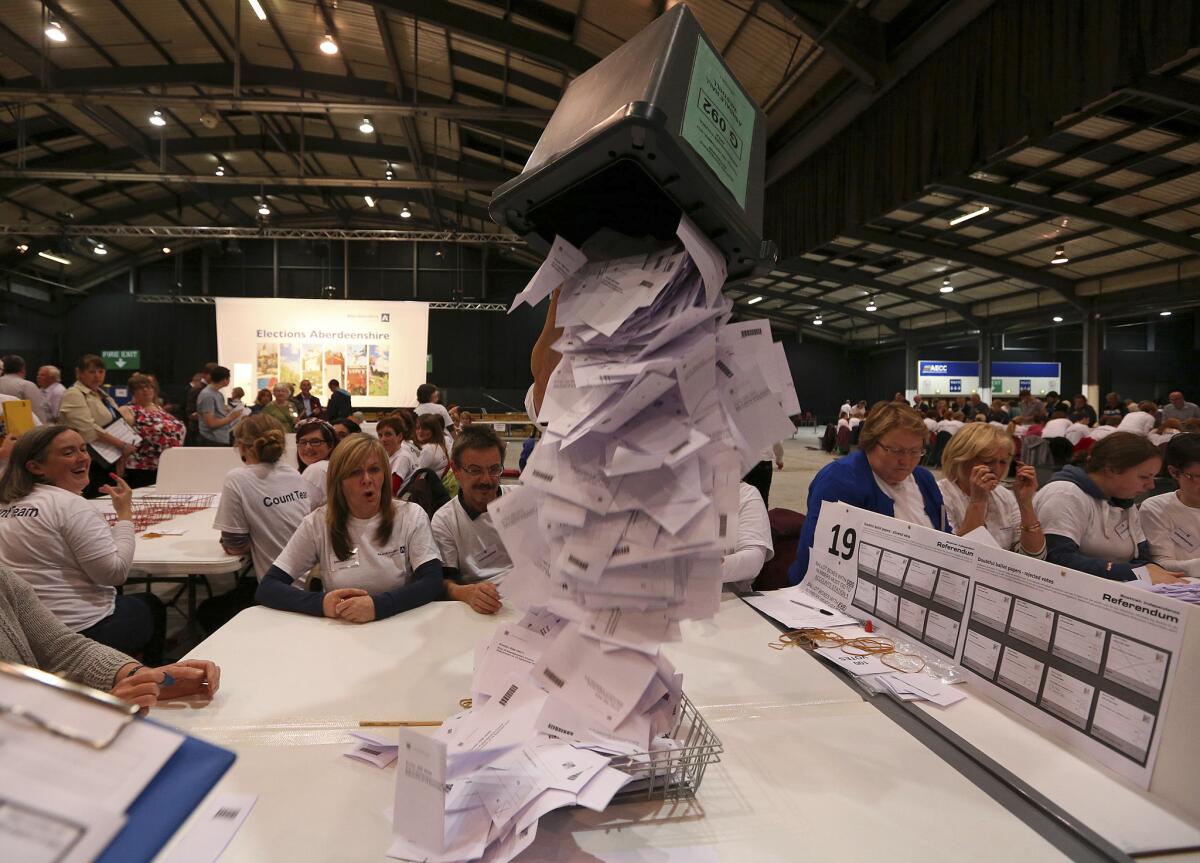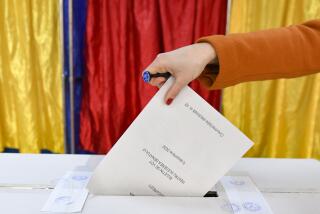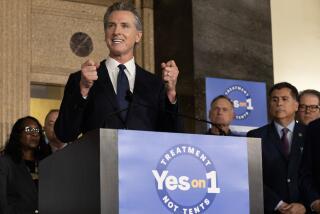Yes or no? Results trickle in from Scotland’s independence referendum

Results were trickling in early Friday in Scotland’s independence referendum, a poll that will decide the future of the 300-year-old union with Britain.
Nine of Scotland’s 32 local authorities reported “no” votes, some by a significant margin. Two others came out in favor of independence. But the areas accounted for a small percentage of registered voters.
In some of the more remote parts of Scotland, helicopters and boats were being used to ferry ballots to counting centers.
The referendum, which will be decided by a simple majority, sparked intense interest with many areas reporting turnouts well above 80%. Voters were glued to television screens in pubs specially licensed to stay open through the night.
A steady stream of voters cast ballots at more than 2,600 polling places throughout the day Thursday.
“Yes” supporters say they want to take power from British politicians in London and place it in the hands of decision-makers in Edinburgh.
“No” campaigners warn that independence, which would reduce the United Kingdom to England, Wales and Northern Ireland, would bring unwanted economic risks. Questions remain over what currency an independent Scotland would use and whether it could rely on continued tax revenue from its dwindling oil and gas reserves in the North Sea.
The British pound rose slightly against the dollar after a postelection survey showed Scottish voters rejecting independence. It had dropped by more than 6% in recent weeks, partly over uncertainty about the outcome of the Scottish vote.
For Jeremy Thornton, the decision about how to vote was a difficult one. Outside his polling station in central Edinburgh on Thursday, he said he still hadn’t made up his mind.
“I genuinely don’t know how I’m going to vote when I go inside,” he said. “Up until recently I was a firm ‘no’ voter.”
Thornton said he had been convinced that independence was too risky a proposition, an argument Scotland’s pro-union “Better Together” campaign has tried hard to make.
Yet, Thornton said, he started wavering over the last few days. “I’m definitely in two minds. I think a ‘yes’ vote I’m nervous about. It brings in a lot of uncertainty,” he said. “But it may just be a fear of change.”
The benefits of independence have started to look appealing, he said, noting that on the plus side, Scotland’s government would be more directly elected.
“I think you should be able to vote for the government that rules you,” Thornton said. “And the more I think about it, the more I think, ‘Well, why is that not just the right thing to do, regardless of the risks?’”
He was still considering the question as he walked through the early morning fog to cast his ballot with his wife, Jennifer, a firm “no” voter.
“It’s been hell with him. It’s just like, make up your mind,” she said. “On the way up here, he’s gone back and forth four times, and at this stage I just told him to be quiet. I can’t take any more. He has really good arguments for both sides, and then I’m starting to sway. And then I go, ‘No, hold on a second.’”
More than 4 million people – including for the first time 16- and 17-year-olds – were registered to vote out of a population of 5.3 million, and turnout was expected to be high.
Officials reported lines forming at some polling stations before the doors opened at 7 a.m. With three hours of balloting left, an official at one Edinburgh station said well over half of the registered voters in the district had voted. He expected to reach 75% by the time the polls closed at 10 p.m. and said he had never seen such high turnout in previous votes.
The referendum also brought supporters of other separatist movements around the world to Scotland.
“I’m here because I want independence for Catalonia,” said Montse Berdura, who traveled to Edinburgh with 10 other Catalans from their small town near the Spanish city of Barcelona.
Catalonia’s pro-separatist regional government is planning a nonbinding referendum on independence from Spain on Nov. 9, though the central government in Madrid has said it will use its authority to block the balloting.
“I want to support Scottish people to have independence first,” Berdura said. “If Scotland gets independence, it will be easier for Catalan people to be independent.”
Marie-Jose Laforest was in Edinburgh from Quebec, which has failed in two referendums to secede from Canada. “I’ve come just for the vote for the independence of Scotland,” said Laforest, who hopes Quebec will someday try again.
Others in search of independence hailed from closer to Scotland. Aran Jones drove to Edinburgh from Wales to volunteer for the “yes” campaign. He said he’s spoken to so many potential voters over the last week, he was losing his voice.
Wales is not home to a strong independence movement, with a recent poll showing that only 17% of Welsh respondents would support breaking away from Britain. But Jones said he wants to replicate the enthusiasm of Scotland’s independence movement in Wales.
“We have a lot of work to do,” he said. “We take a lot of lessons back from this, and they’re lessons really about the groundwork we need to be doing now to increase engagement.”
Opinion polls showed the outcome in Scotland too close to call heading into the vote, leading to a flurry of last-minute campaigning.
“This is our opportunity of a lifetime, and we must seize it with both hands,” Alex Salmond, Scotland’s pro-independence first minister, told supporters in Perth on the eve of the referendum.
Former British Prime Minister Gordon Brown gave an equally impassioned speech at a rally in Glasgow, urging voters not to let nationalism break apart the United Kingdom.
“Let us tell the undecided, the waverers, those not sure how to vote. Let us tell them what we have achieved together,” he said. “We fought two world wars together, and there is not a cemetery in Europe that does not have Scots, English, Welsh and Irish lined side by side.”
But after weeks of wall-to-wall television coverage, reports on the “yes” and “no” campaigns came to a sudden stop Thursday. Strict rules required that the broadcast media in Britain refrain from covering campaign activity while voting was taking place.
Outside a polling station in Edinburgh, Anna Wright said she was wavering a bit as she stood in the voting booth but ultimately chose “no.” She felt the economic risks of independence were too great.
“It’s so close, it could go either way,” she said. “If it’s a ‘yes,’ I definitely wouldn’t be sad. I was a little bit worried about how things will go, but at the end of the day it will probably work out eventually. And I think in the long term it’s definitely a better option.”
Still undecided, Thornton walked inside another station to cast his vote, and emerged a few minutes later having chosen “yes.”
“I’m surprised myself, I think,” he said. “I’m a bit shaken actually. I definitely have reservations.”
Werth is a special correspondent.
More to Read
Start your day right
Sign up for Essential California for news, features and recommendations from the L.A. Times and beyond in your inbox six days a week.
You may occasionally receive promotional content from the Los Angeles Times.






